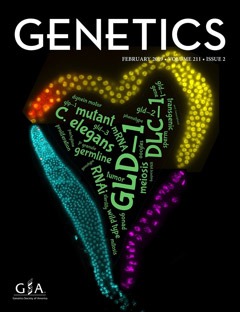Overview
The James F. Crow Early Career Researcher Award recognizes outstanding achievements by students and recent PhDs presenting their work at the Population, Evolutionary, and Quantitative Genetics Conference. Finalists for the award will speak in a high-profile session at the conference.
GSA created the award to honor Professor James F. Crow. Crow’s contributions to the field of genetics were impactful and innumerable. Crow and his students revealed the rates and fitness consequences of mutations, discovered segregation distorter loci, and began the characterization of P transposable elements, using Drosophila melanogaster as a model system. His theoretical achievements included laying the foundation for the neutral theory of molecular evolution, reformulating the concept of genetic load, and understanding the effects of inbreeding on genetic variation. Crow’s textbook “An Introduction to Population Genetics Theory,” published in 1970 with Motoo Kimura, remains the gold standard text for theoretical population genetics today. With Bill Dove, Crow co-edited the monthly “Perspectives” section of GENETICS for more than 20 years. Crow’s own written contributions to the section (45 articles) masterfully situated controversies and leaders in genetics in their historical context.
Crow seamlessly integrated research with outstanding teaching and a passion for public service. Crow excelled at explaining genetic concepts to a wide range of audiences, making him an unusually effective and popular teacher. He spoke to people he met in the community with the same admiration and excitement with which he greeted his scientific colleagues. Crow was that rare colleague whom everyone loved: a model scientist and an exemplary human.
Crow considered his students to be his greatest gift to science. It is in this spirit that the Genetics Society of America presents the James F. Crow Early Career Researcher Award to honor and celebrate Crow’s legacy.
The overall winner will be selected by the conference keynote speakers and organizers.
Eligibility
To be considered for the James F. Crow Early Career Researcher Award, you must:
- be a GSA member;
- be a student or recent PhD (PhD awarded after January 2021);
- conduct population, evolutionary, or quantitative genetics research;
- have submitted an abstract for presentation at TAGC2024.
Application Process
When the application period is open, applicants should click on the “Apply Now” button. All applications should include should include:
- A copy of their CV
- A copy of published manuscripts and publicly posted preprints that are the main components of their doctoral theses
- The ID number of the abstract they have submitted to the Conference and a copy of their abstract text
- A short essay (250 words) that describes how the applicant became interested in science, their career path, and why their chosen research area is important. These should be targeted toward a general audience.
Applicants should also arrange for two letters of recommendation (see application site for more information). The letters should focus on the applicant’s contribution to research, paying particular attention to the significance and innovation of the applicant’s work.
Important Dates
The application deadline is November 10, 2023.
Previous Finalists
2022 (Winner) Ailene MacPherson, Simon Fraser University
2022 Malgorzata Gazda, Institut Pasteur
2022 Julia M. Kreiner, University of British Columbia
2022 Jacob L. Steenwyk, Vanderbilt University
2022 Bo Xia, New York University
2020 (Winner) Carl Veller, Harvard University
2020 Cara Brand, University of Pennsylvania
2020 Moisés Exposito-Alonso, Stanford University
2020 Pavitra Muralidhar, Harvard University
2020 Yuval Simons, Stanford University
2018 (Winner) Katherine Xue, University of Washington
2018 Jeremy Berg, Columbia University
2018 Alison F. Feder, Stanford University
2018 Amy Goldberg, University of California, Berkeley
2018 Emily B. Josephs, University of California, Davis
2018 Emily C. Moore, North Carolina State University
2016 (Winner) Sarah Sander, Cornell University
2016 Matthew S. Ackerman, Indiana University, Bloomington
2016 Emily Behrman, University of Pennsylvania
2016 Heath Blackmon, University of Minnesota
2016 Gili Greenbaum, Ben-Gurion University
2016 Sandeep Venkataram, Stanford University
Support the Crow Award Fund
Ensure the sustainability of this community award by contributing to the Crow Award Fund. GSA is a 501(c)3 non-profit organization. Contributions may be tax deductible.



